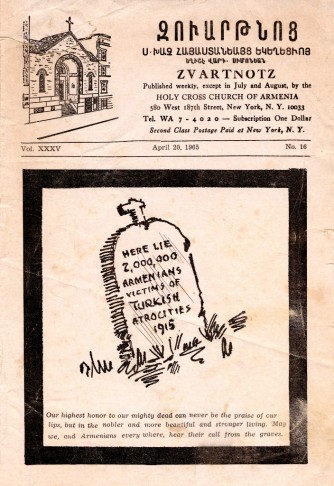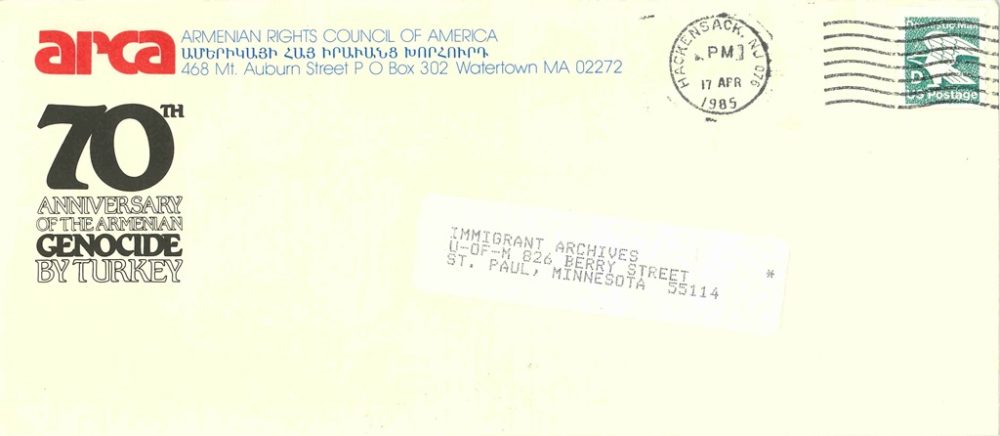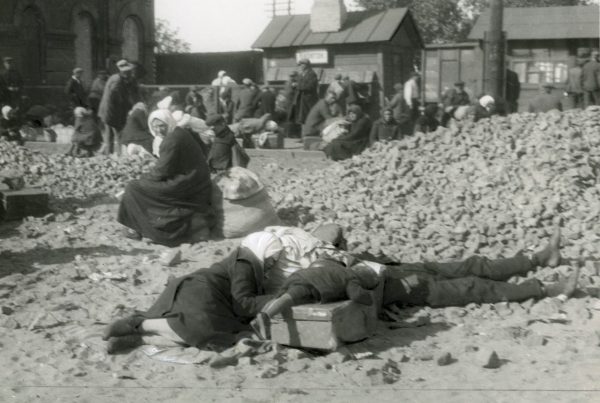By Jamie L. Hoehn
Assistant Archivist, Migration and Social Services Collections
Throughout 2015, there have been many regional, national, and international events to commemorate the centennial of the Armenian Genocide, which is recognized as having begun on April 24, 1915. It was on that date when several hundred prominent Armenians living in Constantinople were arrested and subsequently deported or executed.
Over the next several years, an estimated 1.5 million Armenians, a Christian minority in the declining Ottoman Empire, died by means of mass execution, death marches through the Syrian Desert, disease and starvation. Many more Armenians fled their ancestral homeland, resulting in a permanent global diaspora.
IHRCA commemorates centennial of Armenian Genocide
 The Immigration History Research Center Archives is commemorating the centennial of the Armenian Genocide in a number of ways this semester:
The Immigration History Research Center Archives is commemorating the centennial of the Armenian Genocide in a number of ways this semester:
- We are pleased to announce that we have installed a new exhibit in the case outside the IHRC & Archives offices featuring a sampling of items from our collections related to the Armenian Genocide. This exhibit will be on display outside Andersen Library 311 until December 15, 2015.
- We have also compiled a corresponding research guide highlighting IHRCA sources pertinent to the Armenian Genocide. We hope this guide will prove useful to students researching issues surrounding genocide, reconciliation or remembrance.
- Additionally, on October 21 the IHRCA is co-sponsoring an author talk, during which professor and journalist Lou Ureneck will discuss his book The Great Fire: One American’s Mission to Rescue Victims of the 20th Century’s First Genocide. Ureneck’s research for his book relied in large part on sources held by the Kautz Family YMCA Archives. At the talk, we and the YMCA Archives will feature items from our collections. This event is free and open to the public. Please join us!
IHRCA sources offer insight into past commemorations
While the Armenian Genocide does not define the Armenian-American people, as no single event can possibly characterize the collective memory of any group, it is evident that the thread of these atrocities is woven throughout the fabric of modern Armenian culture. This shadow of genocide can be discerned in many of the print sources in the IHRCA and it is alternatingly explicit and subtle, severe and reflective.
Certain sources, such as political pamphlets and memoirs, focus on genocide and its repercussions; within other sources, the references to genocide are more veiled. The IHRCA has a diverse collection of associated newspapers, serials and scholarly journals written in Armenian and English.
The IHRCA’s archival material which relates to this topic is primarily from the Armenian-American perspective and is often commemorative in nature. The bulk of the materials range from 1960-1990, partially due to the fact that 1965 and 1985 were significant anniversaries (50 years and 70 years, respectively).
There were also a number of bills moving through Congress during the 1980s, at both the state and federal level, to commemorate the events of 1915-1923 and to officially declare the atrocities as genocide. The IHRCA holds the records for several organizations which either supported or opposed these legislative efforts, including the Armenian Cultural Organization of Minnesota (IHRC240) and the Federation of Turkish American Societies (IHRC647).
Need help? Contact the IHRCA
If you are interested in researching the Armenian Genocide using sources held by the IHRCA, please write to us at IHRCA@umn.edu. We would be happy to send you a copy of our Armenian Genocide research guide or we can help you identify other sources based on your specific research query.
To help you learn more, we have compiled a list of Genocide and Holocaust related materials in Archives and Special Collections.





